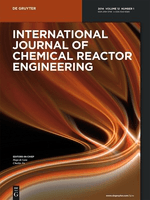
International Journal of Chemical Reactor Engineering
Scope & Guideline
Exploring the Dynamics of Chemical Reactions
Introduction
Aims and Scopes
- Chemical Reactor Design and Optimization:
Research focusing on the design principles and optimization strategies for various types of chemical reactors, including continuous stirred-tank reactors (CSTRs), fluidized beds, and microreactors. - Computational Fluid Dynamics (CFD) Applications:
Utilization of CFD simulations to analyze fluid dynamics, mixing, and heat transfer in chemical reactors, providing insights into reactor performance and efficiency. - Catalysis and Reaction Kinetics:
Investigations into catalytic processes, including the development of novel catalysts and the study of reaction kinetics in various chemical transformations. - Wastewater Treatment and Environmental Engineering:
Research on the application of chemical reactor engineering principles to treat wastewater and pollutants, focusing on sustainable and efficient removal methods. - Innovative Reactors and Process Intensification:
Exploration of new reactor designs and process intensification techniques to enhance reaction rates and product yields. - Biochemical and Bioengineering Processes:
Studies related to biochemical reactors, including microbial fuel cells and bioreactors for renewable energy production and waste treatment.
Trending and Emerging
- Sustainable and Green Chemistry:
An increasing number of papers are focusing on sustainable practices, including green chemistry approaches and the use of renewable resources, highlighting the industry's shift towards environmental responsibility. - Nanocatalysis and Advanced Materials:
Research on nanomaterials and their application as catalysts has surged, driven by the need for more efficient and selective catalytic processes. - Artificial Intelligence and Machine Learning Applications:
The integration of AI and machine learning techniques for process optimization and predictive modeling in chemical reactors is on the rise, showcasing a modern approach to enhancing reactor performance. - Bioreactor Innovations for Renewable Energy:
There is a marked increase in studies related to bioreactors, particularly for bioenergy production, reflecting a growing interest in renewable energy solutions. - Microreactor Technology:
The use of microreactors for various chemical processes is gaining popularity, with research focusing on their advantages in terms of efficiency, safety, and scalability.
Declining or Waning
- Conventional Chemical Engineering Processes:
There has been a noticeable reduction in studies focusing on traditional chemical engineering processes that do not incorporate advanced technologies or methodologies. - Single-Phase Reactor Studies:
Research dedicated solely to single-phase reactor systems has decreased, likely due to the increasing complexity and relevance of multiphase and biochemical systems. - Basic Theoretical Modeling:
Papers focused exclusively on basic theoretical models without practical applications or experimental validation have become less frequent, as the field trends toward more applied and integrated approaches. - Static Mixing Technologies:
The emphasis on static mixers in isolation appears to be waning, with a shift towards dynamic mixing technologies and their applications in complex systems. - Traditional Waste Treatment Methods:
Research on conventional methods for waste treatment is declining, as newer, more sustainable approaches gain prominence in the literature.
Similar Journals
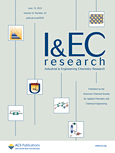
INDUSTRIAL & ENGINEERING CHEMISTRY RESEARCH
Fostering Collaboration in Chemical Engineering DiscoveriesINDUSTRIAL & ENGINEERING CHEMISTRY RESEARCH, published by the American Chemical Society, is a pivotal journal that disseminates high-quality research in the fields of Chemical Engineering, Chemistry, and Industrial and Manufacturing Engineering. With an impressive impact factor, this journal ranks in the top quartile (Q1) across multiple categories, reflecting its significance and influence within the scientific community. Since its inception in 1987, IECR has provided a platform for researchers, professionals, and students to publish innovative findings that advance the understanding and application of engineering chemistry. Though it operates under a subscription model, the journal continues to foster collaboration within the field, inviting contributions that span theoretical advancements, experimental studies, and practical applications. Whether you are engaged in academia or industry, IECR serves as a vital resource for staying abreast of the latest developments in chemical and engineering research.

Frontiers of Chemical Science and Engineering
Connecting Researchers for Global ImpactFrontiers of Chemical Science and Engineering is an esteemed journal published by SPRINGER, dedicated to advancing the rapidly evolving domain of chemical engineering. Located in New York, USA, this journal provides a vibrant platform for disseminating groundbreaking research and innovative methodologies in the field. With an impressive Q1 ranking in Chemical Engineering and a Scopus ranking of 54 out of 273, it occupies a prominent position, reflecting its high impact and relevance among academic circles. Since its inception in 2011, it has fostered interdisciplinary collaboration, encompassing diverse topics such as process engineering, environmental sustainability, and nanotechnology, making it a vital resource for researchers, professionals, and students alike. The journal's open access policy further enhances accessibility, ensuring that cutting-edge research is readily available to a global audience. As the field continues to evolve, contributions to Frontiers of Chemical Science and Engineering play an essential role in shaping future advancements and empowering the next generation of engineers.
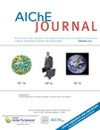
AICHE JOURNAL
Shaping the Future of Sustainable Engineering PracticesAICHE JOURNAL, published by Wiley, is a premier academic journal that has been at the forefront of chemical engineering research since its inception in 1955. With an ISSN of 0001-1541 and an E-ISSN of 1547-5905, this esteemed journal has carved a niche within several vital fields, boasting a 2023 categorization of Q1 in Chemical Engineering (Miscellaneous), Q2 in Biotechnology, and Q2 in Environmental Engineering. The journal’s significant impact is demonstrated through its Scopus rankings, particularly its rank of #62 in General Chemical Engineering and #54 in Environmental Engineering, showcasing its influence and reach in these disciplines. Although not available as Open Access, AICHE JOURNAL plays a critical role in disseminating cutting-edge research essential for advancing knowledge and practice among professionals, researchers, and students in chemical and environmental engineering realms. With convergence expected until 2024, it remains a vital resource for the latest developments, methodologies, and innovations that shape the future of technology and sustainability in the scientific community.
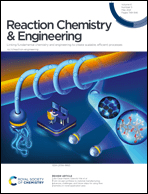
Reaction Chemistry & Engineering
Exploring New Horizons in Process TechnologyReaction Chemistry & Engineering is an esteemed journal published by the Royal Society of Chemistry, dedicated to advancing the field of chemical engineering. With a focus on pivotal topics including catalysis, process technology, and fluid flow, this journal serves as a critical platform for researchers and professionals seeking to disseminate innovative findings and methodologies. As of 2023, it boasts impressive impact factors, ranking Q2 in Catalysis and consistently appearing in the Q1 categories for several related fields, thus recognizing its influence and relevance in the scientific community. With Scopus rankings placing it among the top 30 journals in multiple chemical engineering categories, Reaction Chemistry & Engineering encourages open dialogue and collaboration among scientists aiming to overcome contemporary challenges in chemical processes. This journal is vital for anyone involved in the development and application of chemical engineering, providing essential insights and fostering progress in this dynamic discipline. Explore the latest research and contribute to future innovations by engaging with the cutting-edge work presented in Reaction Chemistry & Engineering.

KOREAN JOURNAL OF CHEMICAL ENGINEERING
Driving Innovation Through Rigorous Research.The Korean Journal of Chemical Engineering is a prestigious publication by the Korean Institute of Chemical Engineers, dedicated to advancing the field of chemical engineering and its associated sciences. Established in 1984, this journal has made significant contributions to the dissemination of innovative research, covering a broad spectrum of topics within chemical engineering and general chemistry. With a current impact factor placing it in the Q2 quartile within both the chemical engineering and chemistry categories, it is recognized for its rigorous peer-review process and high-quality articles. The journal provides a valuable platform for researchers, professionals, and students to share their findings and collaborate on emerging methodologies and technologies. Although it does not offer open access options, its broad international readership, bolstered by its Scopus rankings — including a commendable #108 in general chemical engineering — ensures widespread visibility and dissemination of published works. As it approaches its 40th anniversary in 2024, the Korean Journal of Chemical Engineering continues to be an essential resource for anyone engaged in the field, driving innovation and academic dialogue worldwide.
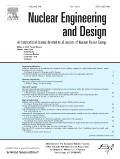
NUCLEAR ENGINEERING AND DESIGN
Driving Progress in Nuclear Safety and ReliabilityNUCLEAR ENGINEERING AND DESIGN is a prestigious journal published by Elsevier Science SA, which has been contributing to the field of nuclear science since 1965. With ISSN 0029-5493 and E-ISSN 1872-759X, it serves as a vital platform for researchers, professionals, and students in areas including nuclear energy, safety, mechanical engineering, and waste management. This journal is highly regarded, reflected in its impressive Q1 status in categories such as Nuclear Energy and Engineering and Safety, Risk, Reliability and Quality, as well as its ranking within the top quartiles of other related fields according to the 2023 category quartiles. Though not an open-access journal, it provides comprehensive insights into cutting-edge research and innovative practices in nuclear engineering, making it an essential resource for advancing knowledge and applications in this critical sector. With a forward-looking scope extending to 2024, NUCLEAR ENGINEERING AND DESIGN continues to influence developments in nuclear technology and safety protocols worldwide.
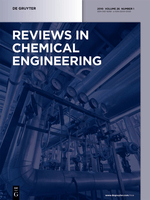
REVIEWS IN CHEMICAL ENGINEERING
Unveiling Cutting-edge Developments in the Field.REVIEWS IN CHEMICAL ENGINEERING, published by Walter de Gruyter GmbH, is a premier journal that delivers cutting-edge insights and comprehensive reviews in the field of chemical engineering. Established as an eminent resource since 1982, this journal is committed to advancing knowledge and fostering innovation in various domains of chemical engineering, including process design, materials, and environmental considerations. With an impressive Q1 ranking in the 2023 Scopus category for Chemical Engineering and a commendable 20th position out of 273 journals, it is recognized for its rigorous peer-review process and high-impact contributions. Although it operates under a subscription model, the journal remains a vital platform for researchers and professionals aiming to stay at the forefront of technological advancements and scholarly discourse in chemical engineering. With a focus on interdisciplinary applications and real-world relevance, REVIEWS IN CHEMICAL ENGINEERING is an indispensable resource for academics, industry professionals, and students dedicated to excellence in this field.

ChemEngineering
Connecting Researchers to Drive Chemical Engineering ForwardChemEngineering is a prominent open-access journal published by MDPI that has been dedicated to the dissemination of high-quality research in the field of chemical engineering since its inception in 2017. Operating out of Switzerland, this journal addresses a diverse range of topics, including energy production, process optimization, and innovations in materials science, thereby attracting contributions from researchers and professionals worldwide. With an impressive Q2 ranking in Chemical Engineering and Engineering, as well as a Q3 ranking in Energy for 2023, ChemEngineering is positioned as a crucial platform for advancing knowledge in its fields. The journal's commitment to open access ensures that its content is readily available to a broad audience, promoting the free exchange of ideas and fostering collaborations. Researchers, professionals, and students alike benefit from the journal's focus on cutting-edge research, making it an essential resource for anyone interested in the ever-evolving landscape of chemical engineering.
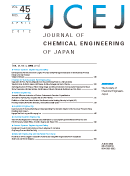
JOURNAL OF CHEMICAL ENGINEERING OF JAPAN
Pioneering Insights in the Heart of Chemical EngineeringJOURNAL OF CHEMICAL ENGINEERING OF JAPAN is a distinguished academic publication in the field of chemical engineering and chemistry, published by Taylor & Francis Ltd. With its ISSN 0021-9592 and E-ISSN 1881-1299, this journal has been a vital resource for researchers and practitioners since its inception in 1968 and continues to provide essential insights and advancements through 2024. The journal operates under an Open Access model as of 2023, promoting wider dissemination of research findings and encouraging collaboration within the global scientific community. Currently categorized in the Q4 quartile for both Chemical Engineering and Chemistry (miscellaneous) in 2023, it ranks within the lower percentiles of its respective fields, offering a platform for emerging scholars to publish their work and gain visibility. As part of Japan's academic landscape, it addresses numerous aspects of chemical engineering, fostering innovation and technical development that contribute to the industry's growth. Engaging with this journal is paramount for those looking to stay informed on the latest research trends and applications in chemical processes.
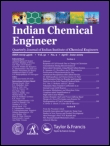
Indian Chemical Engineer
Innovating the Future of Chemical Engineering.Indian Chemical Engineer, published by Taylor & Francis Ltd, stands as a reputable journal in the field of chemical engineering, encompassing a wide range of topics pertinent to both academia and industry. With an ISSN of 0019-4506 and an E-ISSN of 0975-007X, this journal has been a key resource for researchers and professionals since its inception in 1992, undergoing a significant evolution from 2009 to 2024. Currently ranked in the Q3 category of chemical engineering (miscellaneous) in 2023, it reflects a dedicated commitment to disseminating innovative research and insights within the discipline. The journal is indexed in Scopus, achieving a rank of 148 out of 273, which denotes its growing influence in the field with a 45th percentile placement. Although currently not an open-access publication, it offers valuable content that contributes extensively to the advancement of chemical engineering research and education. Researchers, professionals, and students alike are encouraged to engage with this publication to stay at the forefront of industry advancements and academic discussions.